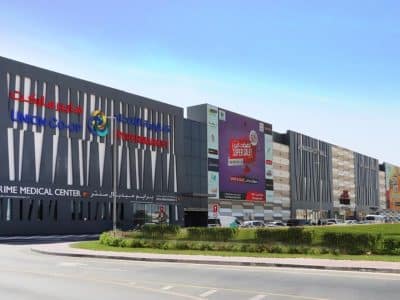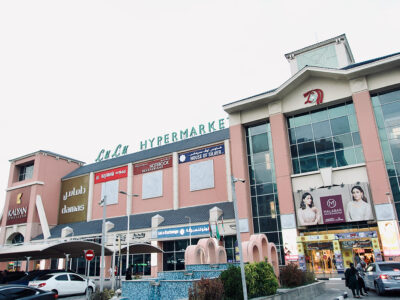In an industry where customer-reach is key to success, several of the UAE’s previously digital-only retailers are launching bricks and mortar stores in an effort to grow their market penetration.
While this is a global trend – even Amazon is operating a slew of physical stores across the US – it is even more important in the UAE where e-commerce accounted for only 8.1 percent of total sales in 2020, despite its inarguable boom during the coronavirus pandemic, according to Taimur Khan, head of research, MENAT at CBRE.
In contrast, e-commerce accounted for 25.1 percent of total sales in the UK in 2020 and 26.6 percent in the US.
“Forecasts show that this gap is expected to continue, with non-store retail set to account only for 11.8 percent of total retail sales by 2025 in the UAE, compared to 30.1 percent and 35.5 percent for the aforementioned countries respectively. This indicates that the physical retail segment has a strong and significant future in the UAE’s retail market,” said Khan.
“E-commerce firms realise this and understand the value of physical experiential retail to their brand and local customers (both from a choice and cultural perspective); they understand how such physical retail offerings complement their online presence and in turn encourage repeat visitation and hence conversion,” he continued.
 Taimur Khan, head of research, MENAT at CBRE.
Taimur Khan, head of research, MENAT at CBRE.
Dubai-headquartered online eyewear retailer eyewa was one of the region’s first start-ups to venture into physical stores, with four stores in operation in Saudi Arabia and plans to open several in the UAE by the end of the year.
“We started with a focus on e-commerce but we knew from the beginning we were going to go into offline,” said Anass Boumediene, eyewa’s co-founder.
“We want to be where the customers are. Even though e-commerce penetration is increasing super-fast, we’re still talking about less than 10 percent market penetration so that means that 90 percent of the customers are buying from traditional stores,” he continued.
For eyewa, having a physical presence also means they can do eye examinations, a prerequisite for purchasing eyeglasses and something which cannot be done online, added Boumediene.
 Headquartered in Dubai, online eyewear retailer eyewa was one of the region’s first start-ups to venture into physical stores.
Headquartered in Dubai, online eyewear retailer eyewa was one of the region’s first start-ups to venture into physical stores.
“When you first start a business, you cater to a niche but now we are at stage where we want to grow our business and cater to a wider market,” said the CEO of Dubai born and based online laundry services provider Washmen, Rami Shaar. Washmen opened its first bricks and mortar store in Dubai in June.
“There is still a certain segment of the market, typically those over 50-years-old, who prefer to hand over their precious items to a shopkeeper and have a conversation with them,” Shaar continued.
“It is also very important to humanise the brand because e-commerce can get too transactional and mechanical. That’s why we put our best-trained staff behind the shop desk to explain our services and I will be there frequently to interact with customers,” he added.
 Washmen opened its first bricks and mortar store in Dubai in June.
Washmen opened its first bricks and mortar store in Dubai in June.
Disrupting the bricks and mortar industry
In what is being referred to as ‘phygital’, digital retail natives are using their technology experience to overhaul the traditional physical stores’ model of operation in their industries.
“Digital e-commerce start-ups are wanting to compete in the offline retail space as well and believe they can do better than the traditional conglomerates that have not necessarily been innovating. A lot of these digital natives will bring approaches that are very data-focused into offer. We come from a different world where we move a lot faster and we are happy to try new things,” explained Boumediene.
 Anass Boumediene, co-founder of eyewa.
Anass Boumediene, co-founder of eyewa.
“A lot of the digital natives will come in with their own perspective that is fresh, modern and more efficient and they try to do things differently,” he added.
These online retailers are applying their data gathering and analysis skills to their new physical stores ventures to enhance customer experience.
“We have the opportunity to create a feedback and experience loop on what our customers want by having real conversations with them in the store,” said Shaar.
“Every interaction in the shop is recorded by the shop staff after the customer has left because we are trying to identify these data points and to learn and grow from them,” he continued.
 Rami Shaar, CEO and co-founder, Washmen.
Rami Shaar, CEO and co-founder, Washmen.
Eyewa is diverting from the traditional set-up of optical stores with their rows of eyewear and clinical feel.
“We believe that there is a massive opportunity in the offline retail that is not properly addressed by the existing optical stores. In our physical stores, we focus on the customer-experience with a colourful store that has a curated collection of trending items,” said Boumediene.
A seamless blend
As online retailers venture into the physical space and vice-versa, it is increasingly clear that the retail industry is moving into the omnichannel experience which seamlessly blends the online and offline realms.
“It is not surprising that we are seeing pureplay online retailers looking to establish, and will in time expand, their physical retail footprints. In fact, going forward the dividing lines between the two mediums are likely to be much less distinguishable, and eventually non-existent, as the reality is that consumers are not wedded to only one medium. This convergence will be driven by the integration of technology into physical retail,” said Khan.
 Norma Taki, consumer markets leader and transaction services partner, PwC Middle East.
Norma Taki, consumer markets leader and transaction services partner, PwC Middle East.
Norma Taki, consumer markets leader and transaction services partner, PwC Middle East, said: “Physical stores will remain salient as part of multichannel retail strategies, they will continue to play an important role in product discovery and getting hands-on experience. Proximity and convenience, once again, are key here with the popularity of community malls increasing.”
“What retailers will need to focus on is improving the in-store experience, specifically with the help of emerging technologies such as AI, AR and VR. It goes back to the whole customer experience: how do you attract customers to both your online and offline stores, seamlessly,” she added.








